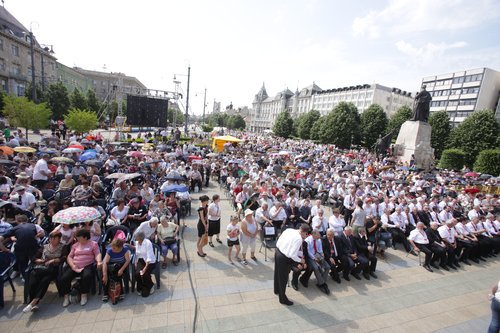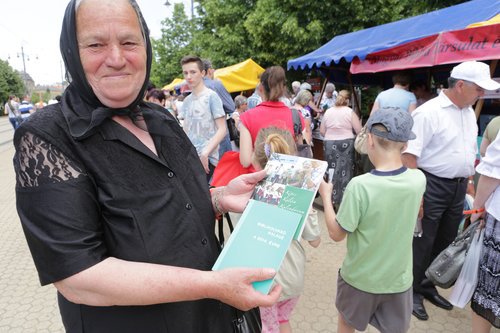In Debrecen on 24 May the Hungarian Reformed Church (HRC) held an event celebrating the 5th anniversary of the Reformed Church’s unity. Church leaders and thousands of people gathered in order to remember the historical moment when the Hungarian communities became united.
The pastoral leaders of the HRC’s member churches from across the Carpathian Basin held a discussion in the assembly hall of the Reformed College in Debrecen, where they emphasized, if there is no unity, there is no future. “We found each other, and we have become a real community. Since then we carry each other’s burdens, we dream our dreams together, and together we accomplish our duties, which were given to us by God," Bishop Sándor Zán Fábián from Sub-Carpathia, Ukraine said about the Hungarian Reformed unity over the past five years. According to him, unity means survival, edification and the future for their community, as well as an opportunity to "not only live, but strengthen and be Christ’s witnesses in Ukraine."

“If there is no unity, then there is no future,” the bishop of the Danubian church district, István Szabó, said. He went on to say that we must proclaim Jesus Christ, because only those who build on Him have a future. Therefore, the world, Europe and our country is in great need of Him. He also stated that unity is quite diverse, and it is always in motion, so sometimes disputes occur. Although that is not a problem, because discourse leads to consensus, people sending messages to each other will not help. The church leader stressed that the Hungarian Reformed community is working toward consensus.
“In the creation of national unity the Reformed Church has always been a leader, and is now,” Bishop Béla Kató emphasized. The Transylvanian bishop believes that we need unity because of our church's decrease, and that we can only stop it if we widen our borders. As he said, smaller communities do not have the strength to deal with their problems on their own. Regarding the future, the church leader added: in order to be efficient, the HRC needs a more organized system, while respecting individual characteristics.

István Csűry, the bishop of Királyhágómellék Reformed Church District, emphasized that we are able to diagnose problems properly, but it is not enough: the Reformed Church has to be a healing church. Béla Halász, the bishop in Serbia continued saying, “Spiritual unity has always existed among us.” I his eyes, he sees unity as a process for which we constantly have to pray and act.
The service of the Church in relation to the most important periods of a human’s life was at the heart of the HRC’s Unity Festival program. The Path of Life showed examples of how an institution, the community or a service branch of the Church addresses people from “the cradle to the grave”, and how the Church helps them throughout their lives. When arranging the program, the organizers focused on practical demonstration and creating a conversational atmosphere. Our Reformed Church’s mission is to show the path with peace and firmness toward the aim of happiness and balance, which is God. The communities representing themselves in the Path of Life show us all that by serving God and the happiness that is given to us by serving Him, God’s work becomes visible in the world.
Read more about the Unity Festival in an interview with RCH General Secretary Zoltán Tarr.
Written and translated by: Tímea Gyarmati